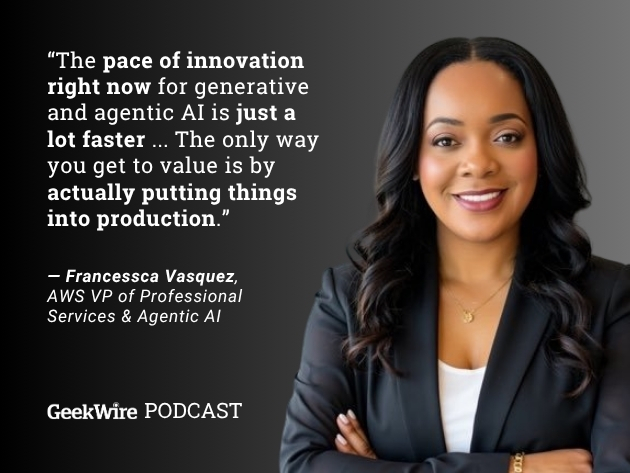Exploring the Future of Enterprise AI Adoption
In a recent episode of the podcast, we had the opportunity to speak with Francessca Vasquez, a vice president at Amazon Web Services (AWS). She leads the company’s efforts in working with enterprise customers through the AWS Professional Services Group and the AWS Generative AI Innovation Center. During the conversation, Vasquez shared valuable insights from over 1,000 customer engagements across various industries, highlighting how companies are transitioning from AI experiments to actual deployments. The discussion covered topics such as the rise of AI agents, challenges in scaling AI initiatives, and the surprising pace of innovation in certain sectors.
Key Takeaways from the Conversation
One of the most notable points was that financial services, manufacturing, and healthcare are adopting AI faster than expected. This can be attributed to their large datasets and rigorous business processes, which make them well-suited for AI integration. However, despite this progress, there are still significant hurdles to overcome.
Gartner has warned that up to 40% of AI agent projects could fail by 2027 due to high costs and unclear return on investment. Vasquez, however, believes that these challenges can be addressed with strong business cases and leadership that is committed to AI. She emphasized that successful AI adoption requires more than just technology—it also involves rethinking how teams work and what tools they use.
Another major challenge is moving from proof-of-concept to production. According to Vasquez, only about 30% of AI experiments typically make it to deployment. However, with the right support, AWS has helped customers achieve success rates of over 50%. This highlights the importance of having strong leadership and a clear vision for AI implementation.
The Rapid Pace of AI Evolution
Vasquez noted that the pace of innovation in generative and agentic AI is unprecedented. She admitted that she cannot predict what the AI landscape will look like even 12 to 18 months from now. This is a dramatic shift compared to previous technology cycles, where changes were more predictable.
She also pointed out that industries that were not traditionally seen as digital leaders are now driving AI adoption. For example, financial services, manufacturing, and healthcare have shown remarkable innovation. This contrasts with the earlier assumption that only digital-native companies would lead in AI adoption.
Real-World Examples of AI in Action
The conversation included several examples of AI being used in real-world scenarios. Yahoo Finance has developed a multi-agent news analysis system, while the PGA Tour uses AI-powered real-time golf commentary. Formula 1 employs an AI-based root cause analyzer to troubleshoot race-day issues, and Jabil uses a shop floor assistant to support manufacturing employees. These examples illustrate how AI is transforming various industries.
Leadership and Culture in AI Success
Vasquez stressed that successful AI deployments require more than just technical expertise. Strong leadership is essential, as companies that are progressing further have leadership teams that believe in the pace of technological change or have senior technical thought leaders on their boards.
Additionally, culture and talent strategies play a crucial role. How companies think about their culture and people becomes a key differentiator in both talent development and attraction. It’s not just about the technology itself but also about the experiences and values that shape the organization.
The Future of AI Agents and Workforce Transformation
Looking ahead, Vasquez expects that any organization offering consulting services will need to integrate generative AI and agentic AI into their workflows. This shift will impact how work is done across industries, requiring organizations to adapt quickly.
As AI continues to evolve at an unprecedented rate, businesses must remain agile and forward-thinking. The future of AI is not just about the technology itself but also about how organizations embrace change, invest in leadership, and foster cultures that support innovation.
